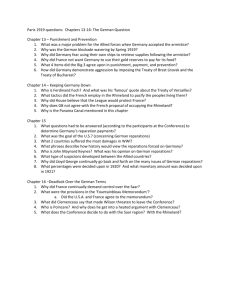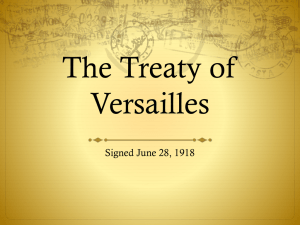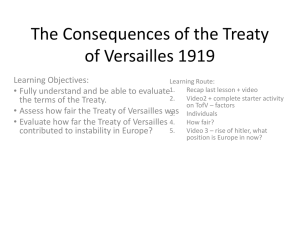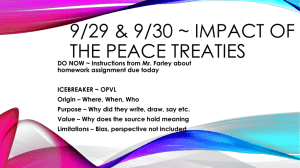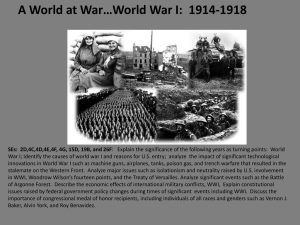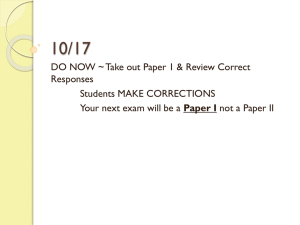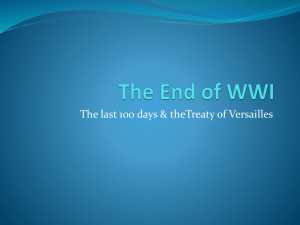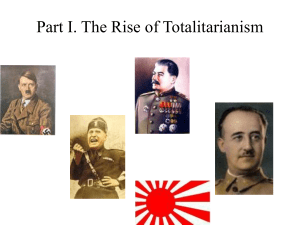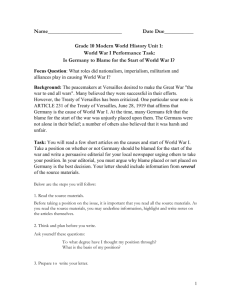What was the German reaction to the Treaty?
advertisement
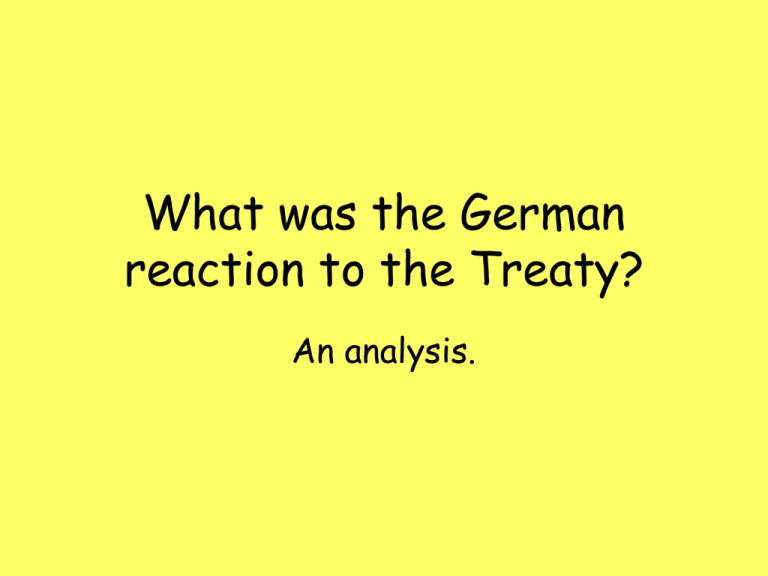
What was the German reaction to the Treaty? An analysis. SOURCE 1 Germans demonstrate against the Treaty, May 1919. What does this photo suggest about German reaction to the Treaty? Why was Germany so upset? • The terms of the Treaty were announced on 7 May to a horrified German nation. Germany was to lose: • • 10 per cent of its land • • all of its overseas colonies • • 12.5 per cent of its population • • 16 per cent of its coalfields and almost half of its iron and steel industry. • Its army was reduced to 100,000 men. It could have no air force, and only a tiny navy. Why was Germany so upset? • Worst of all, Germany had to accept the blame for starting the war and should therefore pay reparations. • The overall reaction of Germans was horror and outrage. They certainly did not feel they had started the war. They did not even feel they had lost the war. They believed that the German government had simply agreed to a ceasefire, and that therefore Germany should have been at the Paris Peace Conference to negotiate peace. It should not have been treated as a defeated state. They were angry that their government was not represented at the talks. • At first, the new government refused to sign the Treaty and the German navy sank its own ships in protest. At one point, it looked as though war might break out again. But what could the German leader Ebert do? • Ebert was in an impossible position. How could he inflict war and certain defeat on his people? • Reluctantly, he agreed to accept the terms of the Treaty and it was signed on 28 June 1919. Complete the diagram into your book, using pages 10 and 11 Losses Disarmam ent Fourteen Points and League of Nations Germany opposed the Treaty of Versailles because War guilt Territories You must explain why each of the terms would have upset Germany. Read pages 10 and 11. What should go onto these placards? Design your own. Which is the most important? This will go at the front. SOURCE 2 What is the message of this source? Why do you think that it was published? A German cartoon published in 1919. The German mother is saying to her starving child: ‘When we have paid one hundred billion marks then I can give you something to eat.’ SOURCE 3 What is the message of this source? Why do you think that this cartoon was published? A cartoon from Punch magazine, 1919. What is the message of this source? SOURCE 4 • The Allies could have done anything with the German people had they made the slightest move toward reconciliation. People were prepared to make reparations for the wrong done by their leaders . . . Over and over I hear the same refrain, ‘We shall hate our conquerors with a hatred that will only cease when the day of our revenge comes.’ • Princess Bleucher, writing in 1920. She was an Englishwoman married to a member of the German royal family. Why did the Germans react so angrily to the Treaty of Versailles? • Imagine that you are in an exam and you have to answer the above question. • You only have time to explain two of the points in your answer. • Decide which two points you would choose. Fully explain your choices. The Germans were not aware of the situation in 1919. War guilt and reparations Disarmament German territories The Fourteen Points The League of Nations What impact did the Treaty have on Germany? Starter – What do the following letters stand for? • G? • A? • R? • G? • LE? Read page 12 in Walsh. • What problems did the Treaty create for Germany? • Define the following key words. Can you link them together in a flow chart? (A*!) • Ebert • Kapp Putsch • Ruhr Uprising • Hyperinflation Look at this source. What does it suggest about the impact of the Treaty of Versailles? SOURCE 5 • People coming from the bank with millions of paper marks in suitcases • • or wheelbarrows. People paying for seats at a theatre with eggs or pats of butter . . . Money that lost half its value in 12 hours. People who had been wealthy trying to sell watches or jewellery for food or articles instead of that hated money. A woman I knew had saved year by year, to assure her son’s welfare. Her capital would have bought enough furniture for a decent house. Three months later it would not pay her tram fare. An Englishman who before the war had lent £6000 in marks; when they were repaid, they were worth about 87p in English money. The middle class was wiped out in a matter of weeks. A German woman describes her problems in 1923; from Vernon Bartlet, Nazi Germany Explained. SOURCE 6 What does this source suggest about the impact of the treaty of Versailles? What does it imply about Franco/ German relations? A German cartoon of 1923. The woman represents France. The text means ‘Hands off the Ruhr!’ Task – What was the impact of the Treaty of Versailles on Germany? It is New Year’s Eve 1923. • You are a German living in Berlin. As a civilian you survived the shortages and the starvation of war. You are writing to a friend in America describing what your life has been like since the war ended. • In your letter, tell your friend about: The general strike in Berlin in 1920. The French and the Belgians taking over the Ruhr in 1923 The awful inflation of 1923. • Explain how each of these problems has been caused by the Treaty of Versailles and how each problem has affected your life. Sources 16-21 in Walsh will help you. You can also find out a lot more about these events on pages 253-58.

